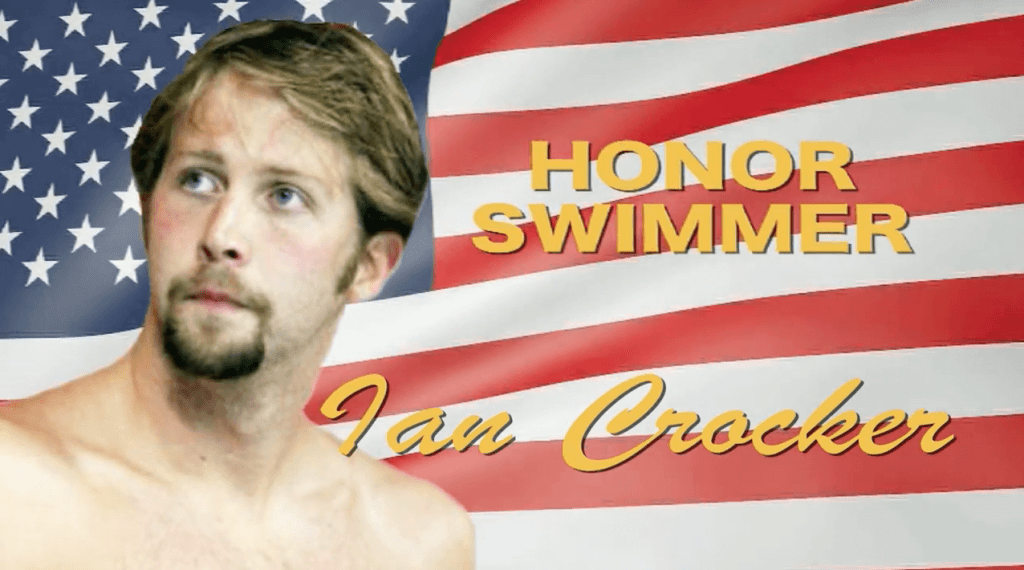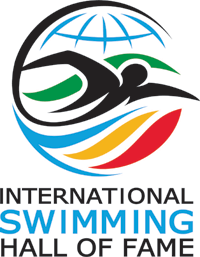Celebrate Induction of Ian Crocker Into International Swimming Hall of Fame (Video)

Relive the special night for Ian Crocker when the International Swimming Hall of Fame inducted the class of 2018 during ceremonies in Fort Lauderdale Florida on May 19th.
Watch This Exclusive Video Commemorating Ian Crocker
Ian Crocker is one of the greatest butterflies in history, but he didn’t exactly grow up in a swimming hotbed. He was born August 31, 1982, in Portland, Maine, a state that has more than 35,000 square miles, yet not one Olympic-sized pool. The pool at the Portland elementary school where he somehow developed his Olympic aspirations was not much more than a 25 yards-long “hole in the ground.” His parents recognized early on that their son suffered from a learning disorder and they felt it was necessary to have him involved in activities that would give him self-esteem outside of academics and keep him well rounded. So Crocker jumped into to the pool, pursued playing the guitar and when he grew old enough to drive, developed an interest in cars.
In 1997, he broke onto the national age group scene with a 13-14 US National record in the 200m freestyle. The next year he became the first U.S. 15-year old to break 1:50 for the 200m free and finished fourth at the 1998 USA Swimming Summer Nationals. The next year, at the same meet he finished 23rd in the 100m butterfly and people started telling him that if he wanted to be an Olympic swimmer, he’d have to leave the state and train in a bigger pool. But he had enormous talent, desire and was blessed with a coach, Sharon Power, who knew what she was doing.
As a 17-year old, Crocker had entered the 2000 US Olympic Trials with a view to gain experience for 2004, but he left the meet winning the 100m fly and breaking Matt Biondi’s Trials record in the process. In Sydney, he finished fourth, but broke Neil Walker’s American record and was a member of the USA’s 4 x 100 meter medley relay that captured the gold.
Now swimming for Eddie Reese, at the University of Texas, Crocker won the 100y fly at the NCAAs and claimed the silver medal in the event at the FINA World Championships. But at the 2002 Phillips Nationals in Fort Lauderdale, 17-year old Michael Phelps rallied in the final yards of the 100m fly to best Crocker and claim the American record. Thus began an incredible rivalry that would last through the Beijing Olympic Games and become the subject of a behind the scenes, feature-length documentary film released in 2005, “Unfiltered: Michael Phelps & Ian Crocker – The Story Behind Their Rivalry.”
At the 2003 FINA World Championships, Crocker watched Phelps break the world record in the preliminaries of the 100m butterfly, but Crocker came back to win the gold and set his first individual World Record in the finals, becoming the first in history to break .51 seconds. Phelps was reportedly so bothered that he tore Crocker’s photograph from a magazine and hung it in his bedroom as a motivator.
At their next confrontation in Santa Clara, in the early summer of 2004, Phelps came out on top. But at the 2004 Olympic Trials, Crocker got revenge, easily beating a tired Phelps (swimming in the last of his 17 races) and lowered his own world record to 50.76. He also qualified to swim in the 100m free, finishing second behind Jason Lezak.
Their race in Athens was ridiculously close, with Phelps taking the gold, with brilliant touch at the wall that had become his trademark and a time of 51.25 to Crocker’s 51.29 seconds. But before the race, it was clear that Crocker had not been feeling well or swimming well. In his first swim, he had a dreadful first leg of the 400 freestyle relay that left the team in dead last and having to struggle to get the bronze medal. In his individual 100m free race, he failed to even get past the preliminaries. In fact he suffered from a sore throat when he arrived at the Olympic village.
Finishing second in the butterfly had also knocked him off the relay, which he had been a part of since 2000. But in a magnanimous gesture of grace and sportsmanship, Michael Phelps stunned the swimming world by giving up his medley spot to Crocker. Phelps justified his actions by saying that Crocker had a better relay start, but also that he had taken Crocker’s malaise into consideration. “He wasn’t feeling too well,” said Phelps. “He deserved another shot.” The gesture brought Crocker to near tears and he didn’t disappoint, splitting a world best time of 50.28 to help his team win the gold and set a new world record.

Photo Courtesy: ISHOF
In 2005, Phelps had backed off a bit on training, while Crocker, having graduated from UT and wanting to redeem himself, was wholly focused on the FINA World Championships. In the much anticipated rematch, Crocker took the lead and had a half body-length lead at the halfway mark. Instead of reeling Crocker in down the backstretch, Phelps actually lost ground to Crocker. In the final 10 meters, Crocker’s finish was compared to Secretariat finishing the final stretch at the Belmont Stakes horse race to win the Triple-Crown in 1973. He was untouchable, and finished a full body-length ahead of the field, winning with a 50.40. It broke his world record by more than three tenths of a second and was an amazing 1.25 seconds ahead of Phelps.
“When you’re racing (Phelps), you have to always assume it’s going to take a world record to win,” Crocker said after the race. “It’s faster than I thought I could go. You can’t put limits on yourself.”
“What happened here,” said Phelps after the race, “I’m going to use for motivation, and hopefully by next summer. I’ll be able to give (Crocker) a race.”
In the much anticipated re-match in 2006, at the US Nationals in Irvine, Phelps came from behind in the final meters to out-touch Crocker. “When we race each other,” said Phelps after the race, “we bring out the best in one another.” Later that month, Crocker, without Phelps in the race, claimed the Pan Pac title in the fastest time in the world for the year.
The showcase event at the 2007 Phillips USA Swimming Nationals in Indianapolis was the Phelps-Crocker rivalry. But just before the start, a photographer’s strobe light inadvertently flashed causing Crocker to flinch. It left him last off the blocks and would result in his disqualification. Still he caught Phelps and eventually took the lead on the first lap, only to have Phelps chase him down on the homestretch for the victory. At the 2007 World Championships, Crocker beat Phelps in the semi-finals, but in the final it was Phelps on top again, with a time of 50.77 – the second man in history to break the 51 second barrier.
By 2008, Phelps was confident and in control, and he faced a new rival in Serbian Milorad Cavic. But lost in their historic finish at the Beijing Olympic Games was that Ian Crocker just missing the bronze medal by the same 1/100th of second that decided the gold medal. Despite not earning a medal in his signature event, Crocker swam in the prelims of the USA’s 4×100-meter medley relay and received his third Olympic relay gold medal.
Ian Crocker retired after the Beijing Games with 21 medals in major international competition, spanning the Olympics, the FINA World Aquatics Championships and the Pan Pacific Swimming Championships. He is one of the only swimmers in history to win the same event (100y butterfly) at NCAA’s all 4 years of college. He set two long-course world records (50m & 100m butterfly) and three short-course records (50m & 100M fly and 100m free). He also retired holding the world record in the LC 100m butterfly. But as was the case with many world records, Crocker’s 100 fly mark was taken down in 2009 by Michael Phelps in the full-body tech-suit era.
Though the sub-50 second swims by Phelps and Milorad Cavic in the 2009 World Championships were astounding, it’s worth noting that Crocker’s 50.40 from the 2005 worlds remained the only swim in the top 10 performances in 100m butterfly history until Joseph Schooling’s gold medal swim at the 2016 Rio Olympic Games, not done in a polyurethane suit. At the 2016 Rio Olympic Games, Joseph Schooling swam the fastest time in a textile suit in a time of 50.39
Ian Crocker enters the Hall of Fame as one the greatest butterflyers in history and one of Michael Phelps’ greatest rivals. He held onto the 100m fly world record for 6 years and challenged the greatest swimmer in the history of our sport to achieve unimaginable success.
Since retiring, Ian continues to be involved in swimming as a coach, swim school operator and clinician for Mutual of Omaha. He also pursues his many other interests, including singing and playing the guitar, tinkering with cars and reading.





Well deserved!
About time! 🙂
My daughter was able to meet him through a swim clinic! She loved it so much! It’s about time they put him in.
Great visit with the Wilton Wahoos a few months ago and excellent speaker!